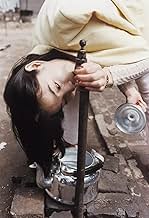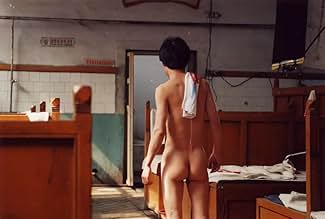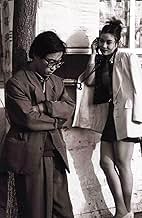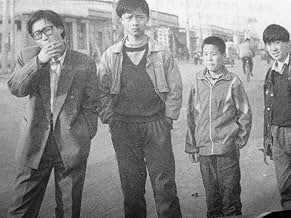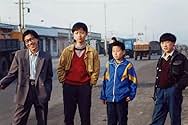AVALIAÇÃO DA IMDb
7,4/10
3,6 mil
SUA AVALIAÇÃO
Os amigos de um batedor de carteiras mudaram para negócios mais elevados, ele encontra-se amargo e incapaz de se adaptar.Os amigos de um batedor de carteiras mudaram para negócios mais elevados, ele encontra-se amargo e incapaz de se adaptar.Os amigos de um batedor de carteiras mudaram para negócios mais elevados, ele encontra-se amargo e incapaz de se adaptar.
- Direção
- Roteirista
- Artistas
- Prêmios
- 7 vitórias e 1 indicação no total
Avaliações em destaque
10cd1793
Xiaowu is an average young man in a typical small town in China. He is shy, stubborn, values friendship, sometimes vanity-driven, sometimes even romantic. And he is a pick-pocket.
It is surprising that although hundreds of millions of people lead their lives like xiaowu, "Xiao Wu" is the first candid depiction of their life in the many years of chinese filmmaking. I was particularly struck by the camera's honesty: run-down buildings along littered streets, filthy public bath places, hidden brothels camouflaged as karaoke shops...
As the country opens up for economical changes, some people have "their own ways" to take advantage of the change and became rich, while the rest struggle to make a living. The film provided vivid portraits of people you probably know or have heard of: the former pick-pocket buddy of xiaowu who became a famous entrepreneur and grew ashamed of having a friend who picks pockets; the girl who works at a Karaoke but tells her mom that she's at school, who dreams of becoming a star and fell in love with xiaowu but eventually "contracted" herself to a rich man from Shan Xi...
Even if you are not particularly interested in the setting of the film, the universal conflict of dignity and making a living, vanity and friendship, dream and reality, makes this film very interesting to watch.
Bravo, Jia ZhangKe! I give this film a 10/10 for being the first of a genre that will shine in chinese cinema.
It is surprising that although hundreds of millions of people lead their lives like xiaowu, "Xiao Wu" is the first candid depiction of their life in the many years of chinese filmmaking. I was particularly struck by the camera's honesty: run-down buildings along littered streets, filthy public bath places, hidden brothels camouflaged as karaoke shops...
As the country opens up for economical changes, some people have "their own ways" to take advantage of the change and became rich, while the rest struggle to make a living. The film provided vivid portraits of people you probably know or have heard of: the former pick-pocket buddy of xiaowu who became a famous entrepreneur and grew ashamed of having a friend who picks pockets; the girl who works at a Karaoke but tells her mom that she's at school, who dreams of becoming a star and fell in love with xiaowu but eventually "contracted" herself to a rich man from Shan Xi...
Even if you are not particularly interested in the setting of the film, the universal conflict of dignity and making a living, vanity and friendship, dream and reality, makes this film very interesting to watch.
Bravo, Jia ZhangKe! I give this film a 10/10 for being the first of a genre that will shine in chinese cinema.
The sound mixing is garbage, with a substantial amount of noise. The dialect cannot be understood. The camera is shaky. The performance is pretty amateurish. The pace is slow. All in all, this film is an unwatchable mess.
He is talented pickpocket but also sends the ids back to police. On the outside he is a boring persona but he has multitude of charisma. He falls in love, which was his chance to get out of all this but couldnt. He isnt ready to let go of his talent until the karma catches up with him. Will he beat the karma or get sucked of even the last bit of conscience he has left. The hiring of non-professional actors makes this film much better.
Unlike a lot of other contemporary Chinese films, Xiao Wu succeeds in gaining viewers empathy for the title character. We never really find out how the so-called "artisan pickpocket" got himself into the state he's in; it's almost as if he woke up one morning to find that he was alone and jobless at an age when he should be settling down like all of his friends. However, not knowing how he arrived at this point makes his growing desperation more tangible as we see him reaching out to everyone he can, only to be rejected.
Wang Hongwei is amazing as the title character, he makes it easy to relate to the character's loneliness and longing. Considering the actors in Xiao Wu are all amateurs, Wang's performance is even more amazing. Granted, he was given a great character to work with: in spite of his occupation, Xiao Wu is a nice guy. (His beautifully awkward relationship with the karaoke hostess is a fine example of this).
All in all, I think this is one of the best Chinese films from the past decade. The characters are better developed than in other contemporary films, and the story is neither contrived nor simplistic. Xiao Wu would seem to be a lot more accessible than other Chinese art films because it lacks the slow bits characteristic of that genre. I would highly recommend Xiao Wu to anyone interested in Chinese cinema.
Wang Hongwei is amazing as the title character, he makes it easy to relate to the character's loneliness and longing. Considering the actors in Xiao Wu are all amateurs, Wang's performance is even more amazing. Granted, he was given a great character to work with: in spite of his occupation, Xiao Wu is a nice guy. (His beautifully awkward relationship with the karaoke hostess is a fine example of this).
All in all, I think this is one of the best Chinese films from the past decade. The characters are better developed than in other contemporary films, and the story is neither contrived nor simplistic. Xiao Wu would seem to be a lot more accessible than other Chinese art films because it lacks the slow bits characteristic of that genre. I would highly recommend Xiao Wu to anyone interested in Chinese cinema.
Xiao Wu is a pickpocket in Beijing. Stuck on the bottom rung of the criminal ladder despite his advance into adult years, he heads a small group of thieving street urchins who haunt the back streets of the city. Xiao Wu is a surly character, prone to throwing away his cigarette ends when in other people's homes. His time is whiled away with games of Mahjong and American pool played out in the street and he has few close friends.
Xiao Wu's brother, Xiao Yong, once himself a petty thief, is now a cigarette trader and brothel-owner. Xiao Yong, shamed by his criminal roots and his brother's failure to move on from the same position, excludes Xiao Wu from his wedding invitations and refuses to accept his wedding gift of ill-gotten money. Later on, Xiao Wu also discovers the shame that his hardworking parents feel for their pickpocket son.
A sense develops that the world is moving on and that Xiao Wu is being left behind; this is increased by the ongoing police-led evictions from the street where he spends much of his time a new building project is on its way. Xiao Wu finds a glimmer of hope in his encounters with Mei Mei, an employee at the local brothel. The taciturn pickpocket opens up a little in her presence and the two of them bond, somewhat oddly from a Western perspective, through karaoke singing. Xiao Wu suddenly finds his singing voice when alone in a bathhouse; his plain voice resounds poignantly in the large, grimy, empty room. It is a rare moment of beauty.
When Xiao Wu buys a pager (state of the art in 1997) to keep in touch with Mei Mei it seems that he is starting to open up just a little to the changing world. But Mei Mei's sudden disappearance, along with his alienation from his family, leaves Xiao Wu without direction. A grim lack of purpose takes hold again. In the final frames of the film he is publicly humiliated, bringing the story to a sad end.
The footage in this film is much grainier than many people made be used to, but this is not necessarily a weakness: the image quality suits the grey, dilapidated city streets. The hand-held camera adds intimacy to the karaoke scenes and captures the distance between the two brothers as they walk separately through the same streets. The muffled state of the soundtrack takes some getting used to, but writer-director Zhang Ke Jia was clearly working on a limited budget for his first feature. The non-professional cast, however, is surprisingly effective; Hong Wei Wang is a real find, exuding a seedy charm in the lead role.
The Artificial Eye DVD which I watched this film on did not provide subtitles for many of the voices on radio and television, nor for some of the secondary characters, but there is an enormous amount of visual detail to take in as well. China simply does not feature enough on cinema screens, but this fine film suggests hope for the future.
Xiao Wu's brother, Xiao Yong, once himself a petty thief, is now a cigarette trader and brothel-owner. Xiao Yong, shamed by his criminal roots and his brother's failure to move on from the same position, excludes Xiao Wu from his wedding invitations and refuses to accept his wedding gift of ill-gotten money. Later on, Xiao Wu also discovers the shame that his hardworking parents feel for their pickpocket son.
A sense develops that the world is moving on and that Xiao Wu is being left behind; this is increased by the ongoing police-led evictions from the street where he spends much of his time a new building project is on its way. Xiao Wu finds a glimmer of hope in his encounters with Mei Mei, an employee at the local brothel. The taciturn pickpocket opens up a little in her presence and the two of them bond, somewhat oddly from a Western perspective, through karaoke singing. Xiao Wu suddenly finds his singing voice when alone in a bathhouse; his plain voice resounds poignantly in the large, grimy, empty room. It is a rare moment of beauty.
When Xiao Wu buys a pager (state of the art in 1997) to keep in touch with Mei Mei it seems that he is starting to open up just a little to the changing world. But Mei Mei's sudden disappearance, along with his alienation from his family, leaves Xiao Wu without direction. A grim lack of purpose takes hold again. In the final frames of the film he is publicly humiliated, bringing the story to a sad end.
The footage in this film is much grainier than many people made be used to, but this is not necessarily a weakness: the image quality suits the grey, dilapidated city streets. The hand-held camera adds intimacy to the karaoke scenes and captures the distance between the two brothers as they walk separately through the same streets. The muffled state of the soundtrack takes some getting used to, but writer-director Zhang Ke Jia was clearly working on a limited budget for his first feature. The non-professional cast, however, is surprisingly effective; Hong Wei Wang is a real find, exuding a seedy charm in the lead role.
The Artificial Eye DVD which I watched this film on did not provide subtitles for many of the voices on radio and television, nor for some of the secondary characters, but there is an enormous amount of visual detail to take in as well. China simply does not feature enough on cinema screens, but this fine film suggests hope for the future.
Você sabia?
- CuriosidadesJia Zhang-ke: the man sent by Xiao Yang to return Xiao Wu's wedding present.
- ConexõesReferenced in Prazeres Desconhecidos (2002)
Principais escolhas
Faça login para avaliar e ver a lista de recomendações personalizadas
- How long is Pickpocket?Fornecido pela Alexa
Detalhes
Bilheteria
- Faturamento bruto mundial
- US$ 1.569
- Tempo de duração1 hora 50 minutos
- Cor
- Proporção
- 1.37 : 1
Contribua para esta página
Sugerir uma alteração ou adicionar conteúdo ausente

Principal brecha
By what name was Artesão Pickpocket (1997) officially released in Canada in English?
Responda
